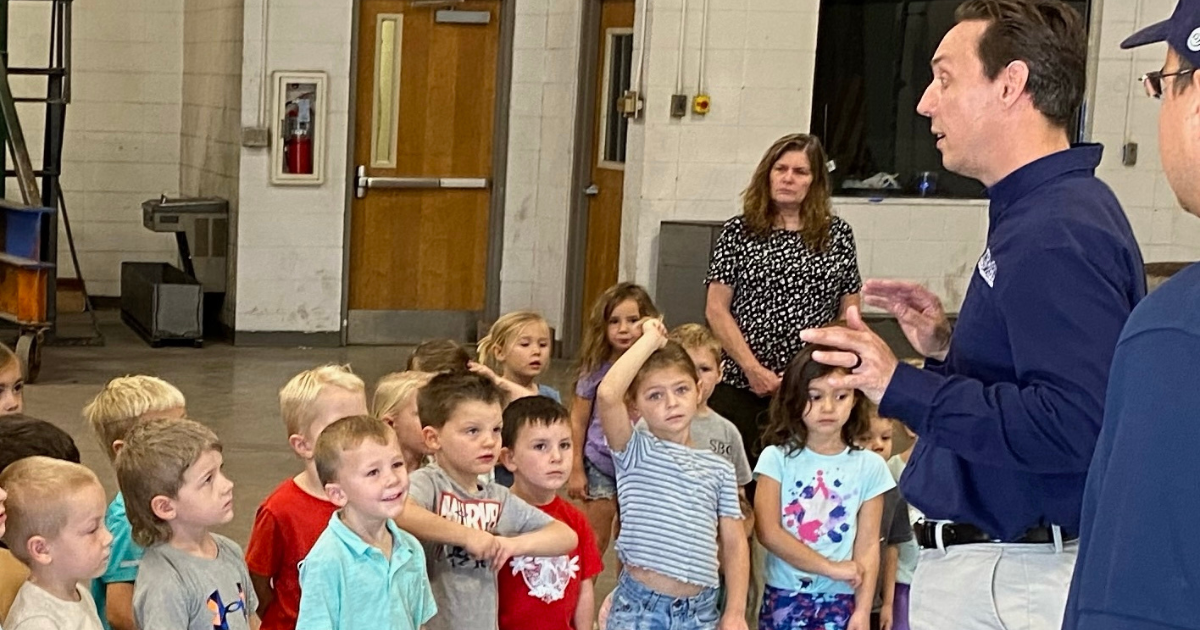Lincoln University Professor Drives Awareness and Action for Improved Water Quality in the Clark Fork Watershed
Office of Communications and Marketing
Young Hall
820 Chestnut Street
Jefferson City, MO 65101
 Dr. Sean Zeiger, LU assistant professor of forest hydrology and watershed management, encouraging students at Cole County R-5 School District to help protect Clark Fork, a local body of water.
Dr. Sean Zeiger, LU assistant professor of forest hydrology and watershed management, encouraging students at Cole County R-5 School District to help protect Clark Fork, a local body of water.
Nationwide, over half of assessed river and stream miles have been deemed "impaired” for uses such as fishing and swimming. Missouri has 2,638 miles of impaired water for fishing and swimming. Clark Fork, a feeder for the Moreau River that runs from Eugene toward Jefferson City, is one of the federally listed impaired bodies of water. As part of a grant-funded initiative, Dr. Sean Zeiger is working to identify and mitigate sources and causes of water quality impairment in Clark Fork Watershed, located in Cole County, Missouri. Dr. Zeiger serves as Assistant Professor of Hydrology and Watershed Management at Lincoln University. To engage and educate the community on the vital role of water resources in Missouri, Dr. Zeiger gave an interactive presentation to students at Cole County R-5 School District in Eugene on November 9, 2023.
When Dr. Zeiger posed the question, "Who enjoys fishing and swimming in our local streams and lakes?" all 400 students from pre-k to 12th grade enthusiastically answered with a collective "Yes!" The question prompted students to reflect on the direct impact of the health of nearby water sources, making the subject matter more relatable.
"They were really excited," commented Dr. Zeiger. "People do care about streams and river water quality . . . they want to swim and fish in clean water."
Dr. Zeiger's approach involved tailoring discussions to each age group, ensuring impactful insights on topics such as the water cycle, precipitation, condensation and evaporation for younger students while addressing water quality problems in Clark Fork with older students.
The highlight of the presentation was the hands-on experience with an Emriver table, a physical model simulating river processes and landform changes. Students actively participated in creating formations, observing water flow impacts and understanding the importance of maintaining healthy streams. Younger students enjoyed searching for colored rocks that looked like gems and planting plastic trees, while older students practiced constructing dams and reservoirs and using culverts to transfer the water down the stream.
Tony Sparer, Yolanda Martin, and Joshua Asiamah from the College of Agriculture, Environmental, and Human Sciences assisted Dr. Zeiger in setting up a water conservation table and facilitating discussions with students after presentations. Ms. Martin, a senior graduating with a Bachelor of Science in Agricultural Business, noted the shifting needed to tailor conversations to the different ages, but stated ultimately, "They all got the same message—water is important."
The Clark Fork Watershed Planning Project is a three-year project that aims to identify and address unknown sources of water quality problems in Clark Fork watershed. The Water Resources Observatory (WRO) at Lincoln University of Missouri, under the leadership of Dr. Zeiger, was awarded $315,000 by the Missouri Department of Natural Resources – Nonpoint Source Management Program. Key collaborators include the Missouri Department of Conservation StreamTeams, Cole County Soil and Water, Cole County Public Health, Boone County Hydrology, The Missouri Resource Assessment Partnership (MoRAP), and the Ozarks Environmental and Water Resources Institute (OEWRI). The project's core focus is on mitigating causes of water quality issues, showcasing the impactful role of Lincoln University's Water Resources Observatory in advancing environmental stewardship.
Dr. Zeiger left students with tangible ways to contribute to improving water quality conditions at Clark Fork. He shared information about the Volunteer Water Quality Monitoring Program (VWQM) through the Missouri Department of Conservation StreamTeams and encouraged students to join. Volunteers can earn multiple levels of certification and receive equipment for monitoring water quality at no cost.
Dr. Zeiger is excited about partnering with five Cole County schools to establish StreamTeams, creating volunteer opportunities to engage in activities at the Clark Fork Watershed Planning Project in the upcoming year. He is eager to plan activities to improve water quality, engage with the community and raise awareness.
He shared, "I'm looking forward to activities where students can just get their boots in the water where they can actually monitor the water quality and do some fun stream-related activities."
For more information on becoming a Water Quality Monitoring Volunteer, please contact Dr. Zeiger at ZeigerS@LincolnU.edu or visit https://dnr.mo.gov/water/get-involved/volunteer-water-quality-monitoring-program.
